Strengthening the rights of refugee workers in the textile sector
Strengthening the rights of refugee workers in the textile sector
During a trip to Türkiye in March, the members of the Partnership Initiative (PI) "Access to Remedy for (Refugee) Workers" were able to see for themselves the work that project partner MUDEM is doing on the ground. Together, they are working on the project to promote access to effective grievance mechanisms as well as effective remedy and redress for (refugee) workers in order to sustainably improve working conditions in the Turkish textile industry.
In addition to gaining an overview of the work that has been done so far, the aim of the trip was to create even greater visibility for the issue of access to remedy and to jointly discuss the long-term perspective of the cooperation. To this end, the group travelling to Türkiye, which consisted of representatives of the participating brands Adidas, Puma, Primark, Jefferys, C&A and NKD, MUDEM, the BMZ, GIZ Turkey and the Partnership Secretariat, completed a three-day program that reflected the multi-stakeholder character of the Partnership for Sustainable Textiles and involved stakeholders from politics, the private sector and civil society.
Cooperation across stakeholder groups is essential
This became evident in one of the highlights of the trip, a roundtable with numerous local and international NGOs. The meeting was all about exchange and specifically focussed on the topic of remedy. Project partner MUDEM, a Turkish NGO that aims to strengthen the rights of refugees, presented its Workers Support Center (WSC) and sensitized the participants for the situation of refugees in textile supply chains. The WSC is a digital contact point set up by MUDEM that workers in textile production can use to request support in case of problems in the workplace. Primark also gave an input at the NGO roundtable to show from the perspective of a brand what remedy and redress can look like and what role brands (can) play here. Both presentations served as the basis for subsequent group work. Representatives from business, civil society and politics discussed what good redress can look like in different contexts, especially for vulnerable groups, what role is attributed to the various stakeholder groups and which interfaces can be better utilized. The three groups each dealt with the topics on which Mudem receives the most complaints on: work permits, wage issues and workplace abuse. Despite the different subject areas, the results of the group discussions showed overlaps: Cooperation between the various stakeholder groups is essential and should be intensified in the interests of rightsholders. Only by working together can the situation for all workers, and especially for vulnerable groups, in textile production in Türkiye be further improved.
The program also included exciting and inspiring meetings with other relevant institutions, such as the German Consulate General in Istanbul. Deputy Consul General Martin Graf welcomed the project group there and outlined the Consulate's activities at the intersection of human rights and business, among other things. This was followed by an in-depth exchange between the brands, the PST and Martin Graf, covering a range of topics including corporate due diligence, future supply chain legislations and the involvement of various stakeholders such as NGOs and trade unions. The project group was delighted with the great interest shown by the Consulate in the topic. Furthermore, a meeting with Turkish business association Türkonfed took place, which is currently setting up the Responsible Business Helpdesk (RBH) for Türkiye. The aim of the RBH is to raise awareness and provide advice to companies on standards and requirements in the area of due diligence.
The Workers Support Center in practice
In the spirit of close cooperation with the suppliers of the participating companies, the group visited suppliers of Primark, Puma and NKD on the second day of the trip. This enabled an intensive exchange with the respective management of the factories as well as an insight into the implementation of the WSC.. The suppliers Detay Textil and Türkmenler Socks have already established and integrated the Workers Support Center at their production sites. The members of the Partnership Initiative had nominated their suppliers at the beginning of the project and were now able to see the WSC in practice at the visited factories.
The conclusion and another highlight of the trip was a workshop on the long-term financing of the project. In addition to the members of the Partnership Initiative, MUDEM had invited other companies to attend, including Lindex, Mango, H&M, Varner, Marks & Spencer and Inditex. The aim of the meeting was to look ahead to a long-term, self-financed perspective for the project: the Textiles Partnership has been supporting the Workers Support Center with funds from the Federal Ministry for Economic Cooperation and Development since 2021 and until the end of 2024. However, in order to achieve long-term stability and foresight for the project, a sustainable solution is needed that is independent of funding tied to project terms. The long-term goal of such pilot projects is therefore to transfer them into local and self-financed structures. During the workshop, the brands expressed great interest in financing the project independently after the end of the project term. The Partnership Secretariat expressly supports this development.
At the end of the three-day trip, the participants were pleased with the results. Thomas Ahlers, representative of Primark, is also optimistic about the continuation of the Worker Support Center:
"Supporting appropriate, independent and industry-wide grievance mechanisms is an integral part of our "access to remedy" approach. We have been working with Mudem and the Worker Support Center for several years. The trip to Istanbul and the meetings with the group, but also with other brands and NGOs, were very open and transparent. I believe that the right course has been set for the continuation of the Worker Support Center."
The Partnership Secretariat would like to thank all members of the travel group for their valuable input and great commitment, as well as the various hosts for good conversations, inspiring insights, enriching discussions and delicious cay, coffee and baklava.
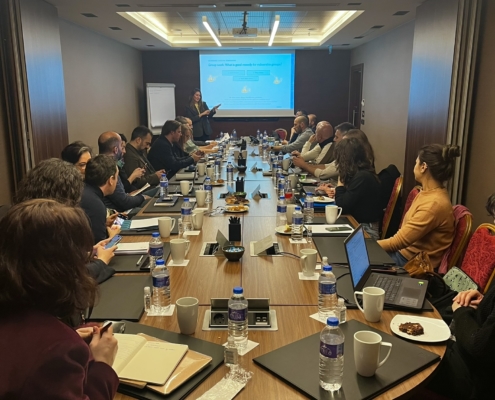
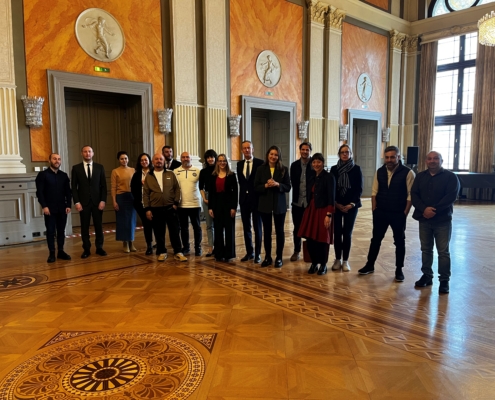
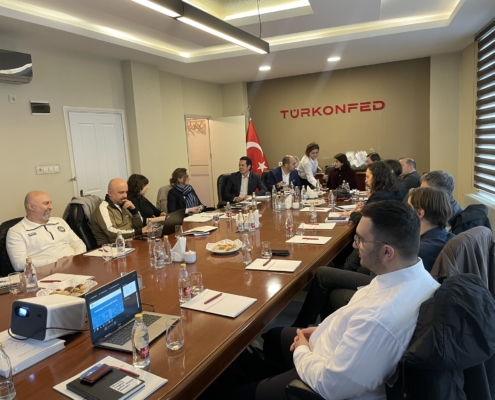
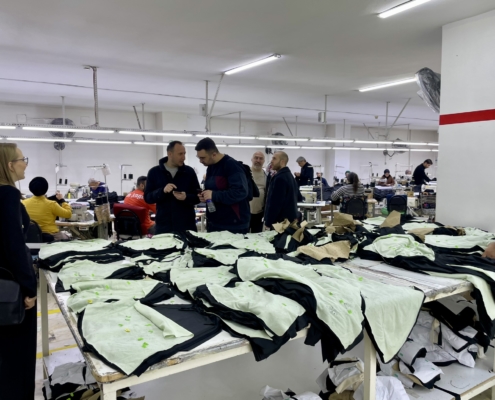
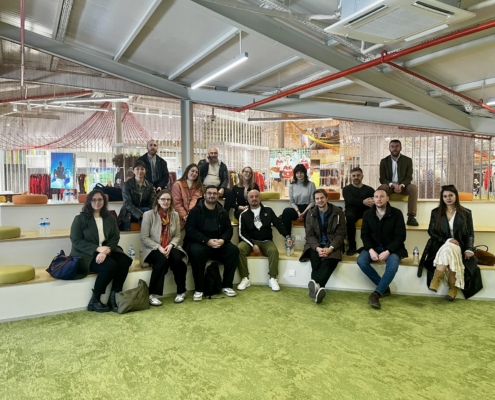
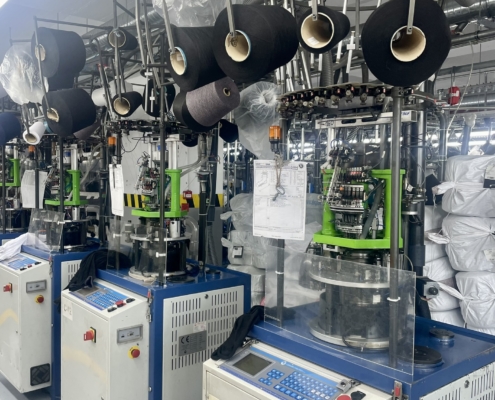
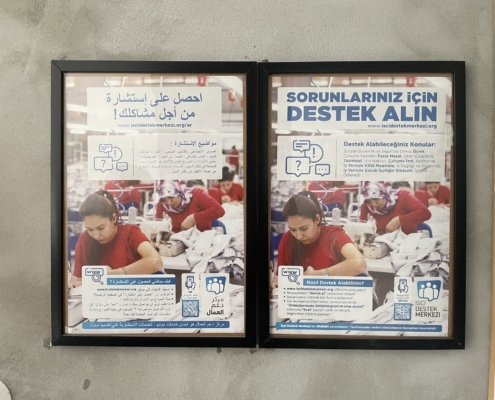
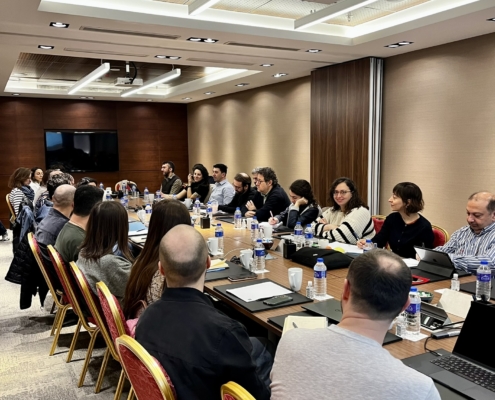
About the Partnership Initiative
In Turkey, a large number of refugees, especially from Syria, are employed in the textile supply chain, some of them informally. They represent a particularly vulnerable group that is sometimes affected by multiple discrimination (e.g. legal status and gender). Many of those affected do not speak Turkish and have little or no knowledge of their rights. In addition to an awareness of their rights, these people need a low-threshold communication channel to draw attention to grievances in the workplace.
This is where the PI comes in: During factory visits in the Turkish textile industry, refugees, but also people from the host society, are made aware of their rights and the use of grievance mechanisms is promoted. The visits are carried out by the Turkish partner organization MUDEM, which set up the "Worker Support Center". The WSC is a digital contact point and grievance mechanism that employees can use to request support for problems at the workplace. During the training sessions, employees receive information on the WSC, labor rights, employee rights, employer and employee obligations and other grievance mechanisms.
The Partnership Initiative is part of the Partnership for Sustainable Textiles, funded by the German Federal Ministry for Economic Cooperation and Development (BMZ) and implemented jointly by Primark, C&A, NKD, Jefferys, IVY OAK, Kik, textilekonzepte, Adidas, Ceres, Puma and GIZ.




